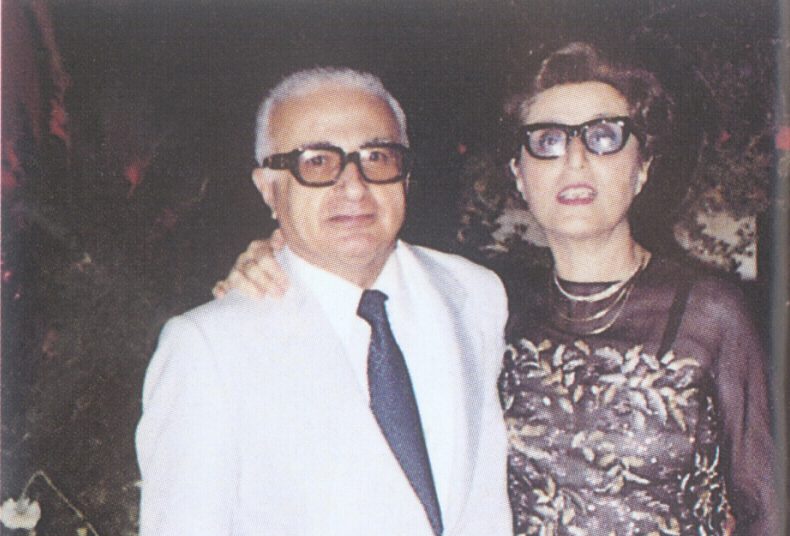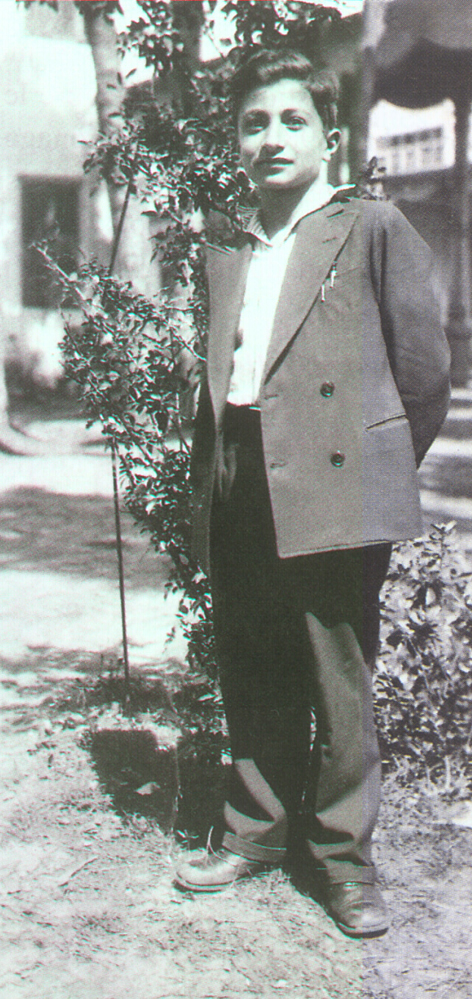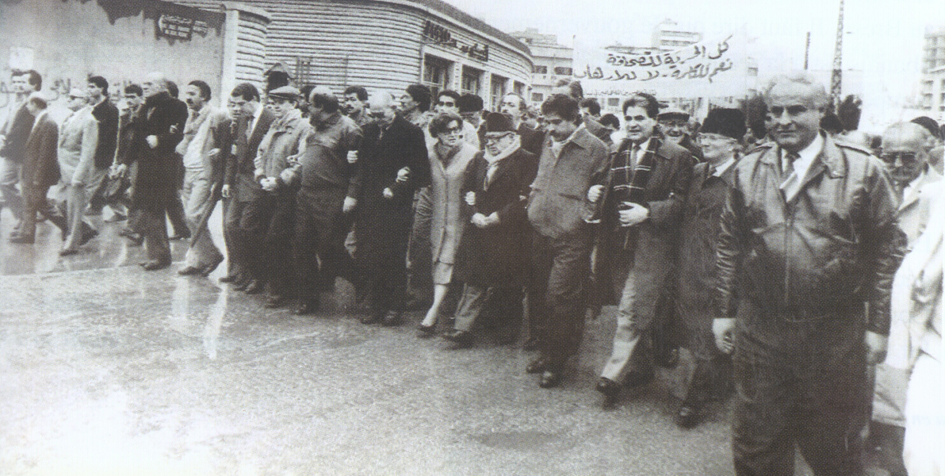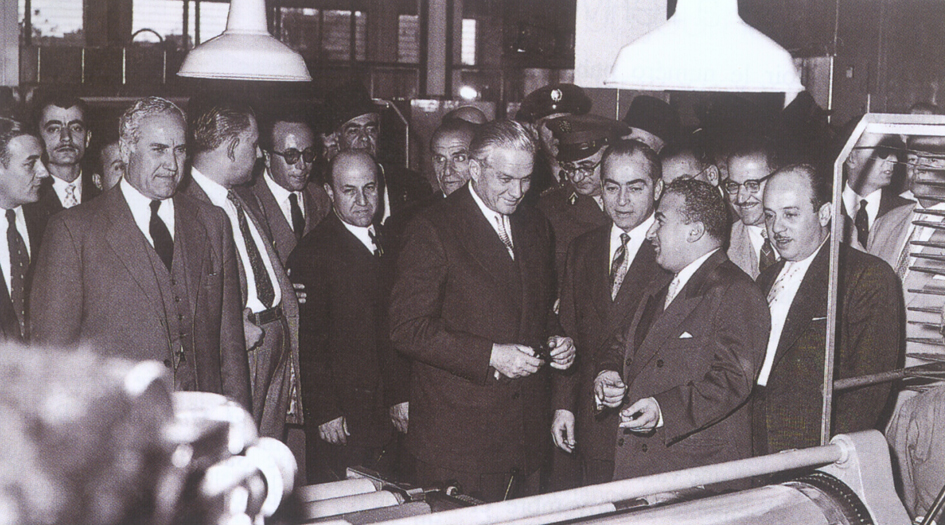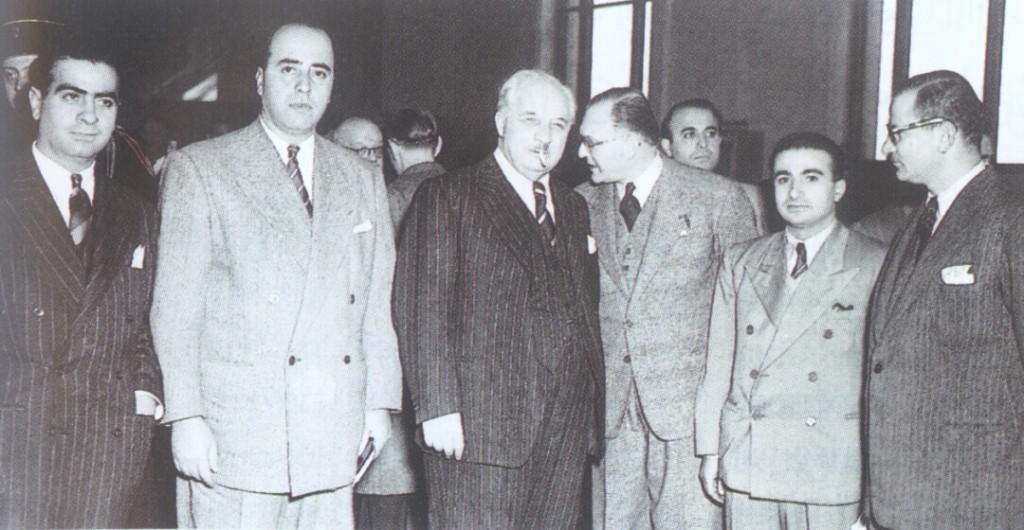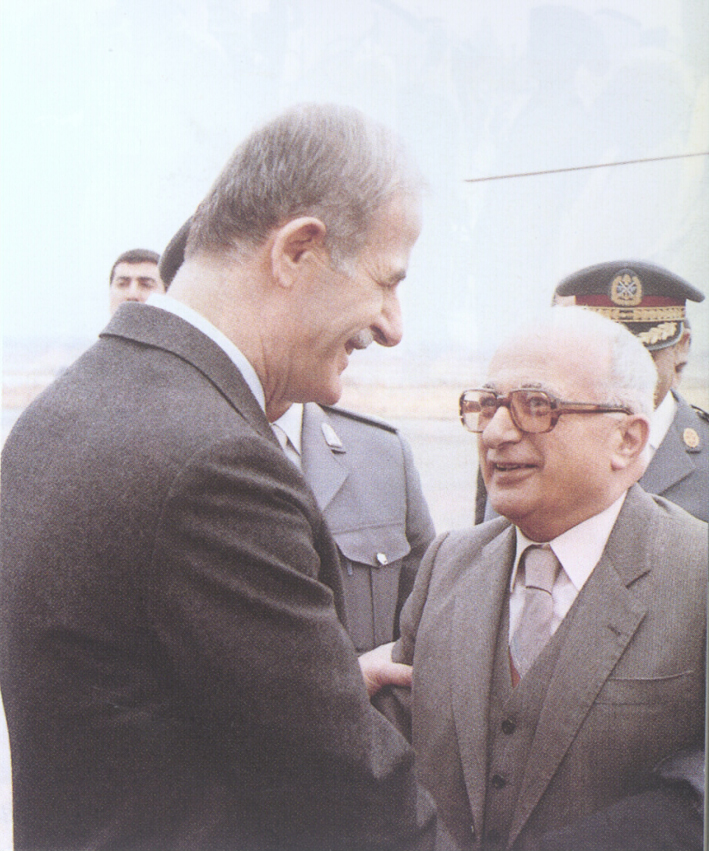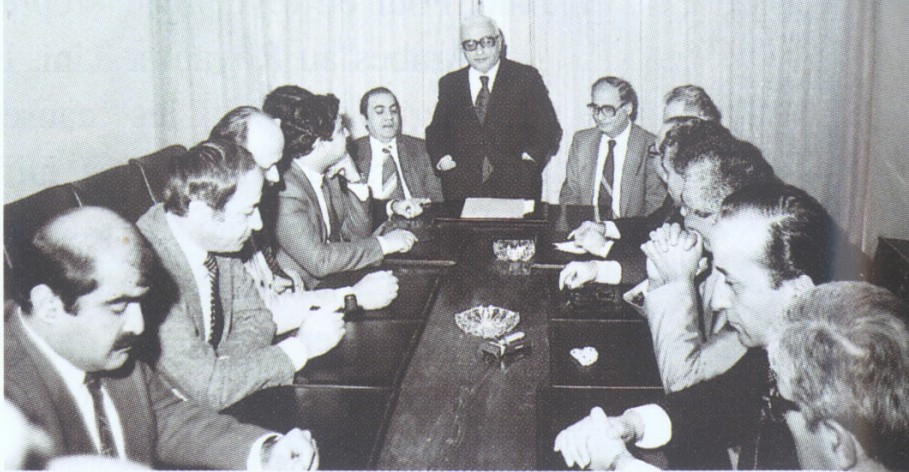Prestige issue 80, January 2000
No evasions. No compromise. He adheres to the movements of history, marking his opinions. Loyal to his friendships but uncompromising in his principles, this man of the press is defined as the defender of freedom of expression. This is probably what established him in Lebanon for more than a decade as President of the Fourth Power…
© Archives Mohammed Baalbaki
The President of the Press Union and his wife Maguy. She has waited for him seven years until his release from prison.
An old building in Beirut, with arches and red tiles.On the second floor of this house that belonged originally to the Salam family, lived the family of Abdel Hafiz Baalbaki. His wife Bdour Dimashkié gave him three sons Afif, Mounir and Mohammed. The youngest will not know his mom since she died in 1921, ten days after his birth. Today it is with emotion that the man describes the mural paintings of this building that no longer exists. Destroyed like so many others, to make way for modern squat buildings.
A FAMILY HISTORY. Between the two tram stations Al Ariss and Nouairy, Mohammed runs a sweet and peaceful childhood with his brothers, Aziz, Nazih and Nabih, and Aziza Darwish al Houssami he considers like his real mother. The Baalbaki forge friendships with many Beiruti families: Fakhoury, Zantout, Kabbani, Kaddoura. His uncle Badr Dimashkié, head of the municipality of Beirut, is one of the first Muslims to marry a Christian, Julia Tohme. A pioneer in the struggle for the emancipation of women, she is the owner and chief editor of Al Mar‘a al Jadida, one of the first Lebanese magazines targeting women and advocating their cause. Badr founded two organizations, for “tourism” and “Lebanese tree,” collaborating with Drs Fouad Ghosn and Amine Gemayel, grandfather of President Gemayel. His father was a tailor in Beirut, a specialist in Arab costume. All the notables of the city dressed at Abu Afif, head of the Union of designers and founder of the technical section of Makassed. Abou Afif was also a music lover, he liked tarab. Like all his neighbors, he went to Omar Daouk, the only one with the radio to listen to broadcast songs and marvel at the magic box. Abou Afif finally acquired a phonograph and could enjoy hours of Abdel Wahab and Umm Koulsoum songs. Abdel Hafiz Baalbaki will travel to Egypt regularly to attend recitals of the great Arab singer Oum Koulsoum.
MAKASSED: A SCHOOL. Mounib Jaroudy taught him the alphabet, Toufic El Baba the Quran, Ghaleb Turk French and Omar Farroukh Arabic. Baalbaki and Salah Abbouchi Were his favorite students but so turbulent that, as soon as he entered the class, he wrote illico on the table: Salah and Mohammed on restraint. One day, we shouted to him, “Sir, Salah is absent”; he replied: “he will still be retained.” It is here, in the primary school of Makassed whose director is then Abdallah el Machnouk that Baalbaki began his career in journalism. Noureddine Medawar introduced him to the press. He leads him one day to Abdel Wahab el Inglizi street, to the printing house of Youssef el Khazen, which published the newspaper Asharq of Aouni Al Kaaki, shows him the hardships, finally asked him to work there in the summer as a volunteer proofreader.
© Archives Mohammed Baalbaki
It’s at the Elementary School of Makassed that Baalbaki encounters journalism.
FIRST BURSTS. With the 30’s, the revolt became more violent against the mandate, demonstrations almost target the tramway, French symbol. We raised the fists in front of the Pines residence, High Commissioner’s residence. At Makassed, we did not sing the national anthem, the one of a subjected state, declared by General Gouraud. We did not hoist the red white blue banner with the Lebanese cedar in the center. It is only after 1943 that we will see the real Lebanese flag floating above the Makassed. Master Zaki Naccache teaches History; at the beginning of each course, he heads to the table and drew the map of Greater Syria locating the doctrine of the Nationalist Party in the minds of young students. Naccache is incarcerated one day. His students learn much later that he was a member of the underground party led by Antoun Saadeh. At the time, everyone is in favor especially as the union of the country’s natural Syria goes with the prospect of liberation. Naccache, released, is acclaimed by a large student demonstration that will remain marked in the memory of Baalbaki.
STUDENT IN CASSOCK. With Salah Abbouchi and Rafiq Ghandour, he took acting classes. Together, they repeated outdoors. One day, the director Abdullah al Machnouk and Mufti Mohammed Toufic Khaled enter the classroom. They want to found a religious institute of Muslim law in parallel to the school program. 14 schoolchildren including Baalbaki access to this privileged school: a teacher for each student. He was charged to read the Friday sermon at the mosque of the seraglio, near the coffee Automatic. He was under 16 years old. A year later, a new Nazer is appointed. Fanatic, he modifies the programs, switched everything in favor of the religious courses that outweigh those of the official baccalaureat. The Nazer goes even further: now no more sport and wearing shorts is strictly prohibited. Mohammed decided to give up, unable to go out without cassock and turban. As he wants to prepare his doctorate in theology in Switzerland, he is desperate to catch up with the normal school … and stay on good terms with the mufti. This was done with the Director’s approval.
Of high school, Baalbaki remembers the reception of the king of Morocco Mohammed V by the schoolchildren. He also remembers the day when Machnouk returns his copy of Arabic literature without noting, with the statement: “Higher than the level required.”
UNIVERSITY CHALLENGE. The American University of Beirut awards two scholarships annually to brilliant graduates of Makassed: Baalbaki and Khalil Itani will benefit of the scholarships. Although he does not speak a word of English, Mohammed got his BA in Arabic Literature from AUB but he needed to master English to follow the philosophy courses of Charles Malek. He said: “What matters most to you, Doctor, base or form?” Malek replied: “The base of course” “And if one of your students presented a copy of excellent philosophy, but written in Arabic? ‘”” I trust you, only you can not ignore the rules. We need the dean’s authorization. “The dean will accept. Mohammed Baalbaki therefore benefits of the scholarship and increases efforts. It is in the branch devoted to Islamic works in the great library of AUB that he deploys his efforts and knowledge. He classifies manuscripts, submits reports on each. He is simultaneously editor of a student magazine, AL Ourwa.
FIRST MEETING WITH NATIONALISM.
The two years 40-42 were marked by his meeting with a political movement then in vogue, Arab Nationalism founded by Dr. Constantine Zreik: Baalbaki stumbles on the red booklet that contains the basic principles and the way of thinking of the party; with President Takieddine el Solh, a student like them and Professor of Arabic for halftime at the French Secular Mission, Nasra. End 1941 Takieddine el Solh founded Al Diyar with Hanna Ghosn. Baalbaki is editorial secretary. The first issue is a real triumph. At one, a map drawn by Baalbaki at that time, the use of maps was not frequent, representing the Russian-German front and goading patriotic sentiment in Lebanon and the Arab world. Vichy and the Germans were driven out of the country recently. Simultaneously, Baalbaki preparing his degree thesis Introduction to the study of the literature of the Qur’an, which has two parts, one dealing with old and modern methods for the study of the Holy Book and the other of his own suggestions to approach it as an exceptional literary book. He shines at the defense of his thesis led by a jury composed of Anis Khoury Makdessi, Gabriel Jabbour and Constantine Zreik and receives an A +.
TEACHER FOR SEVEN MONTHS. After graduating and further to his work at Al Diyar, he became professor of Arabic language, literary criticism, history and geography. Teaching allows him to be friends with many students including General Ahmad el Hage, Mounah el Solh, the Minister Bahije Tabara, Ghassan Tueni, MP Said Fawaz and businessman Nasri Abu Sleiman … Among them, an intelligent clergyman, the future patriarch Aghnatios Hakim. He gives his course of history and geography, Wednesday afternoon, holiday in the French section. Which complicates his task especially as the course was considered as a minor course. Normal! It is only required at oral. Baalbaki is quite clever: to interest the students, he finds an original way: the first part is done in class, the second outdoors. While walking, we talk of history and also politics … well. Some students are members of the PPS, others, like their teacher, the Arab Nationalist Party. During these endless discussions, everyone defends his own ideas. Later, Mohammed broke with the Nationalist and became a member and responsible at PPS. Journalism and education go hand in hand. But this dual activity gets Mohammed tired and at the end of the year, suffering from pleurisy, he was forced to rest for three months in the mountains. The antibiotic is not yet discovered. After the treatment, his doctor, Fotiades, a Greek, obliges him to choose between the two professions and advises the press, less stressful for the lungs. He puts an end to education, a business career practiced during just seven months.
QUESTION MARK FOR INDEPENDENCE
In early autumn begins in Lebanon the movement for independence. A new Council is charged to rewrite the Constitution. The French High Commissioner decided to suspend the daily Assia of Toufic Wehbe, advisor of the Syrian delegation for negotiations on independence. It was formed by young nationalists such Naim Moghabghab, Mohammed Choukeir and Emile Boustany … They agree to publish a daily newsletter under a big question mark. Written by patriotic pens, it is published during ten days, in each case by a different press. 2 or 3 numbers are prepared at Mohammed Baalbaki.
The people hastened to obtain it; the French mandate is indignant and surprised…
AL DIYAR, THE SOLH SCHOOL. The most important daily before 1943 prepares all minds to independence. Its committee is composed of major press figures: Takieddine el Solh, Hanna Ghosn and others…
Takieddine el Solh ends his Arabic courses at 4pm and then heads to the newspaper premises at Foch Street near the small seraglio and the Ministry of Economy, and close to Downtown. He prepares meticulously the editorial, the last article for printing. He writes it in one gulp and then reworks it, brings a few changes. All the journalists of the time learn to write editorials at the school of President Al Solh. Salah Abboushi was working in Baalbeck, at the Company of Railways, his friend Mohammed called and offered him a job at Diyar. Salah Abbouchi worked there as a proofreader.
PRESS AND LABOR MOVEMENT. After independence, Al Diyar published a special issue, now priceless, related to November events and drafted largely by Hanna Ghosn that focuses on large very specific times and events of that time..
In the daily offices, we look at the Ministerial Declaration.
Solh chooses expressions and phrases taken with special care. This period allows Baalbaki to achieve himself in the profession at all levels: administrative, editorial, political. The newspaper does not have its own printing press. It goes to press at Abdel Malak. Baalbaki, Editor in chief, does not leave the scene until having completed all the work, almost never before dawn. He makes the acquaintance of the labor movement which most Socialist members work at the printing, among others, Mustapha el Ariss, Saadeddine Moumni, Hanna Zarka, Antoun Sarkis …
PRESS: INFLUENCE AND SHOCKING ARTICLES. Besides his work at Al Diyar, Baalbaki writes at Al Aahd of Fouad Kassem, his former dramatic art teacher. Similarly, he collaborates with Said Freiha at Assayad founded since two or three years. Mohammed approaches again the 40s and cites a shocking article published by Al-Diyar. The State of Israel is not yet declared. Americans and especially President Truman clearly sympathize with the Hebrews. Their bellicose statements find no echo in the press, until one day … the articles of the time were accompanied by pictures. Baalbaki requests one evening of the printers to put Truman’s cliché upside down. The next day, the scandal is the one! The US embassy protested violently against this insult to the president of United States. After apologizing to the embassy and having ensured them that it was a printing error, the editor in chief demands explanations from Baalbaki. The latter replied: “One should shake Truman who is exaggerating!” Another night at the printing press, Baalbaki learns from Cairo Radio the death of singer Asmahane, ally of the English. He once again changed the headline and added on one: “The murder of Asmahane”. The next day, the other newspapers did not have time to publish the news, Al Diyar is the only to spread it on the front page and thus marks a point in the press … not so easy to win for Baalbaki, who was sharply reprimanded for taking his own decision to change the headline … but the issue is exhausted in a few hours and the newspaper’s management hastily change its attitude towards Baalbaki.
© Archives Mohammed Baalbaki
At the head of a demonstration of the press against “terrorism” and for freedom of expression.
A PRESS WOMAN. Baalbaki as usual opens the mail at Assayad.
A letter with an elegant and extremely subtle style holds his attention, He shows it to Said Freiha, the letter signed by a pseudonym will still be published, and Mohammed Baalbaki regularly received these mysterious letters, one day their author announces herself. Rather a lovely surprise for publishers. She was a lady. Amazement: Jacqueline Hakimian because that is her name, is Armenian … but her pen is the expression of a wonderful and harmonious Arabic.
Hakimian will probably be the first woman to write in a sociopolitical publication. Cordially received at the offices of the magazine, she worked there, until she joined the daily Al Hayat, founded by Kamel Mroué, to hold a heading Haoul Al madina.
© Archives Mohammed Baalbaki
Baalbaki explains to President Chamoun the performance of the modern press.
PHOTOS IN THE PRESS. Serbai and Baalbaki have the chance to acquire a camera, rare at the time, which can take 36 consecutive pictures. So they could photograph at satiety, politicians in incongruous situations and breaks. Scoop of the first issue is an interview with King Abdullah about Greater Syria. The subject attacked is then topical. The article made a great hit. The camera is their great help. While newspapers and magazines were working on shots, Kul Chay is the only daily publishing expressive photos. During the demonstration conducted at Sofar by Abdul Hamid Karami against Bechara el Khoury, Said Serbaï with his eternally suspended camera takes an eloquent picture: Karami, in front of the Police Chief discovers his chest and intimated to him, “Shoot!”. Besides photographs innovation resides in the color level:
Kul Chay was always printed in two black-red colors while the other newspapers were printing just black.
Kul CHAY: AN OPEN FORUM. Kul Chay arises now in open forum although supporter of the government of independence. It gives every citizen the opportunity to express himself: be it communist, socialist or nationalist. Great writers cooperate at the daily, among others Maroun Abboud, George Hanna, Bahij Osman. And this policy is gradually changing to turn into aggressive controversy following the Palestinian crisis and the declaration of the state of Israel in 1948.
His journal: an open forum, where the most virulent controversy can be expressed.
LESSONS THE ENGLISH WAY. Paradoxically, the same year Baalbaki is part of an official delegation to England. Formed by Robert Abela and Baalbaki from Lebanon and Amine Said Zouhair Kabbani and Elia Chaghouri from Syria, it will make a visit of three months in England and Ireland, and will discover the different aspects of the life of the Kingdom: coal mining, the Irish Parliament sessions. A Protestant MP will speak vehemently to the Minister of Education: “Do you know that in such a village in such a school, a Catholic professor was appointed?” A question that reveals the eternal Catholic-Protestant conflict and causes outrage to Baalbaki. The problem certainly arises in Lebanon, but still not to the point of addressing the Parliament! This trip allows him to discover the advanced technologies. He cannot help but notice that the English base their statistics about truths not assumptions. Back in Lebanon, he wrote about the following issue: “40 million people live in the Arab world. One half is composed of uncivilized Bedouins and the other half is modern. Out of the 20 million modern, half are illiterate, the ten million who remain, subtract women and the sick. We conclude that the Arabs as an active force, fighter and modern are outnumbered by the Hebrews. “Resounding article causing endless controversy and his break with Nidaa el Kawmi. In addition, Baalbaki will be inspired by his visit to Times to establish an archive department worthy of the name, future reference in journalism.
TRIALS. An incident in Gemmayzé between the Phalangists and PPS decided the government to suspend the latter and stop its leader. Saade secretly left the country and went to Damascus, where Hosni al Zaim provided him with the necessary weapons to declare the revolution. This does not prevent the two governments to begin negotiations that will lead to the outright extradition of Saade to Lebanon. He was sentenced to death the same night. An expeditious trial that shocked everyone, opponents and supporters. 40 days later. Husni el Zaim was assassinated in a coup. Sami el Hannawi seized power. Baalbaki writes through his daily: “He offered him his gun, weapons and then handed him over to the Lebanese government that executed him as we know!”. Baalbaki and Serbaï appear before a military tribunal presided over by the same officer who condemned Saade. Mohammed is accused of endangering the security of the state. This time it was Dr. Abdullah Al Yafi which is responsible for the defense. Judge pauses before the question mark the key phrase, “What do you mean by that?” Baalbaki briefly: “It’s a question mark.” Judge: “No, we know what you are implying. He was arrested, tried, without him, given the chance to defend themselves … “Baalbaki replied:” Well you say so. Resounding trial Yafi succeeds in proving the invalidity of the charge which is found significantly reduced because: Baalbaki shall be sentenced to three months in prison. Also incarcerated Georges Naccache owner of the L’Orient for his article “Two negations do not make a nation,” Ghassan Tueni, who wrote: “Antoun ‘Saade, martyr,” Clovis Khazen accused of bombing in Kesrouan. Ironically, the latter will be elected later Minister of Information.
Kul Chay publishes articles written with symbols by Mohammed Youssef Hammoud and intellectuals of the PPS: “This tree that we shot” or “this school we closed.” In short, the government is embarrassed by the newspaper’s policy. After the first attack against Ryad el Solh, Kul Chay is suspended for the first time. That night, about three o’clock, right after the assassination attempt, soldiers burst at Baalbaki home, arrest Mohammed and lead him to the seraglio of Bourj. He also finds young people from PPS of which he is a partisan. After three days in detention, they are transported to the prison of Ramel without undergoing interrogation. Two weeks pass, the detainees are still not interviewed. The law allowed at the time the arbitrary arrests of journalists who will fight later to its repeal. After 25 days of incarceration, Baalbaki declares hunger strike. He is then transported to a clinic bed, with cellmates of five prisoners instead of thirty. His hunger strike stirs the country. Kamal Jumblatt comes to publicly ask the reasons why Mohammed Baalbaki had not been questioned.
© Archives Mohammed Baalbaki
At the Chaillot Palace, Paris 1948. Baalbaki came with President Riyad Solh to advocate the Palestinian cause.
PRESS AND NASSER. 1951-1961: the period of Sada Loubnan. It is characterized by three main stages. The visit of a delegation to Egypt in order to establish a link with Nasser and revolution. The delegation consists of Robert Abela, Said Freiha, Ghassan Tueni, Riad Taha, Marc Riachy … and Baalbaki.
THE FALL OF CHICHAKLY. Mohammed sympathizes on one hand with Emile Bustani and on the other side with the Syrian head of state Adib al Chishakli. He is told one day that the latter is seriously ill. Worried, he went to Syria and found him in excellent health! but the eyes darkened by obscure clouds. The problem of the Iraqi-Syrian union is so topical. Syria is torn between two conflicting movements: the first supports the Union, predicting an expansion of the Hashemites, the other opposes taking into account the special relationship that still binds Iraq and Britain while Syria, is released. During the visit of Baalbaki to Shishakli, a reporter takes a photo of the two men in a pool. For the public, it is clear: they are close friends. Back in Beirut, the great businessman Emile Bustani demands to see him in emergency and puts him in a secret affair of state. Bustani is known in the Arab world: he was friends with the leaders of the Gulf. He is even considered as the “conqueror” of the Arab world.
His company CAT has contributed to the construction of roads and bridges and airports. Mohammed Baalbaki learns that despite the obstacles, an international decision was taken on the Iraqi-Syrian union and Shishakli had to approve it. Baalbaki is responsible for notifying him and assuring him of his position of viceroy in Syria as part of this union. Baalbaki sends the message, Shishakli refuses to submit. Responsible of Syrian Independence he believes that he should save it. When Bustani learns his uncompromising position, he drops these words as a verdict: “Shishakli has condemned himself.” Indeed, two months later, the regions of Homs and Aleppo blaze. Faced with military pressure, Shishakli tilts to avoid bloodshed and went to Lebanon, to the Saudi Embassy in Beirut. Later, he will try to return to Syria where he retains strong friendships but President Chamoun, siding with Iraq will not allow it. The irony again is that Adib Shishakli had worked for the election of Camille Chamoun. The access to Syria being banned to him, Shishakli left for Saudi Arabia to go to Switzerland and then to Brazil where he was shot down by a Syrian Druze.
Dunces OF THE UN. At the end of his official visit to England, Baalbaki moved to Paris where he met Charles Malek who headed the UN session to the Charter of Human Rights. At the end of the session, Baalbaki approached and said to him, “Master, you made us proud” and the other replied, “Mohammed, how many dunces are there in the faculty? Well here they are even more numerous. ”
THE US, THIS STRANGE COUNTRY. In 1955, Baalbaki and Georges Naccache conduct a visit to the United States organized by the Educational Exchange. This trip helps to expand their political horizons tremendously. Mohammed spends three months getting to know this strange country, strength and above the impact of the press on the population. He also sees the abuse of ‘Jews in this part of the world. He visited twenty states and met Americans who were surprised to see them travel as much while they have never worried to get out of their region.
© Archives Mohammed Baalbaki
Between Syria and Baalbaki always this stormy passion. Sentenced to 5 years imprisonment by Damascus, pardoned, favorite of heads of state.
«Arrived at Antoun Saadé, he understands that a coup is being prepared in Syria…»
EXPRESSION OF NATIONALISM. His knowledge of the party goes back to his first classes at Makassed. But he only meets Antoun Saadeh at the time of Kul Chay. The leader of the party is persecuted, press is banned from talking about him. Baalbaki is the only one with the courage to offer a space for his articles. Saade is surprised.
Their first meeting took place at the home of a party member: Abdallah Koubrousy. Saade told him of the abuses he suffered. Unofficial but true. A few days later, he received from Saade an anonymous article “PPS a foreign party.” Then the party was accused of collaboration with the Nazis and fascists. The next day, the newspaper received countless letters of indignation:
“How does one acknowledge the PPS to be a foreign party?” Baalbaki shows the letters to Saade who laughed: “They carried themselves even before reading the content.” Baalbaki asks him to regularly write articles and sign them … even discuss the risks to the newspaper. The second article of Saade will be called Al Ourouba aflassat. He denounced the shortcomings of the Arab nationalist party. In the same issue Baalbaki responded with an article: AL Ourouba Lam toufless that will immediately attract the ire of the Arab nationalist party. The gap of dissension will widen between the journalist and the party. Its leaders refuse to participate in a public debate. Baalbaki broke with the party. This will not prevent the publication of many other articles, probably the later writings of Saade …
© Archives Mohammed Baalbaki
In 1982, Baalbaki elected for the first time president of the Press Syndicate in Lebanon.
7th trial, 7 YEARS IN PRISON. 1961 was the last time Baalbaki encountered the world of imprisonment. It is his 7th trial. He will remain seven years and two months in prison … A coup in Damascus puts an end to Syrian-Egyptian union. Syria resumes its independence. PPS thought: “Why not do the same in Lebanon?” Abdallah Saade was elected at the head of the party. Baalbaki, President of the High Council. The case is extensively evaluated to optimize the chances of success. Details are silent. A number of officers were in on the secret: Fouad Awad and Shawki Khairallah, the colonel Ghazi. We even pass on to future appointments. Jawad Boulos President, Colonel Ghattas Labaki, brother of Salah Labaki, Chief of the Army, Fawzi Kaookgi friend of Baalbaki, Prime Minister … The journalist must also contact Afif el Tibé to offer him to become minister of Information. This post was offered to Baalbaki but he prefers to entrust it to Tibé. Their success is indeed almost a certainty. Kidnap the president and senior officials of the state, announce their kidnapping on the radio. The officer Fouad Awad would come from Tyre to the Department of Defense to release Khairallah. Date: the day before New Year. Colonel Antoine Saad, head of the Second Bureau has suspicions about the movements of Awad.. He calls the Presidential Palace at Sarba for emergency action. This simple call aborts the coup. Baalbaki goes to Assad Ashkar. Driving the car, Joseph Nasr, the brother of his fiancée Maguy. They see the kidnapped officers arrive in handcuffs. The conspirators agree: as long as the President is not stopped, the coup is doomed.
At dawn, they understand that the situation is hopeless. The radio announces vaguely an attempted coup mate in the cradle, while Sada Loubnan publishes details of the operation: a real scoop that shocks the public. Baalbaki goes to Joseph Nasr in Badaro and hides two days with him. Together they walk through the museum to hide in the home of the sister of Joseph in Mazraa.
Ten days later, Baalbaki surrenders himself: he calls the lawyer Farid el Haddad and Afif Tibe to accompany him to the Attorney General Emile Hnoud. He is locked up in the barracks of Emir Bashir. His friends are already there: Abdallah Saade, Assad Ashkar, Shawki Khairallah at Kalaa … jail they will be incarcerated in cells. The Minister of Interior Pierre Gemayel disregards political considerations. He ensures that they do not suffer abuse. Many friends including Dr. Albert Moukhaiber use a distinguished French lawyer to come to Lebanon to defend Baalbaki. This lawyer will speak later his admiration for the genius of the journalist. Baalbaki is sentenced to death, later reduced to life imprisonment. Companion of captivity: an Iranian general, Teymur Bakhtyar, cousin of the Empress Soraya. Baalbaki had met him during an official mission to Iran. Bakhtyar then had the favor of the Shah who appointed Director of Security. Baalbaki requested to see him.
The General believes dealing with the journalist, who corrects him: “I’m here just like you.” They become friends. Bakhtyar one day receives a letter from Soraya: she is ready to come support him in Lebanon. Baalbaki advises his companion to dissuade her. Doesn’t Lebanon look like a minefield at that time?
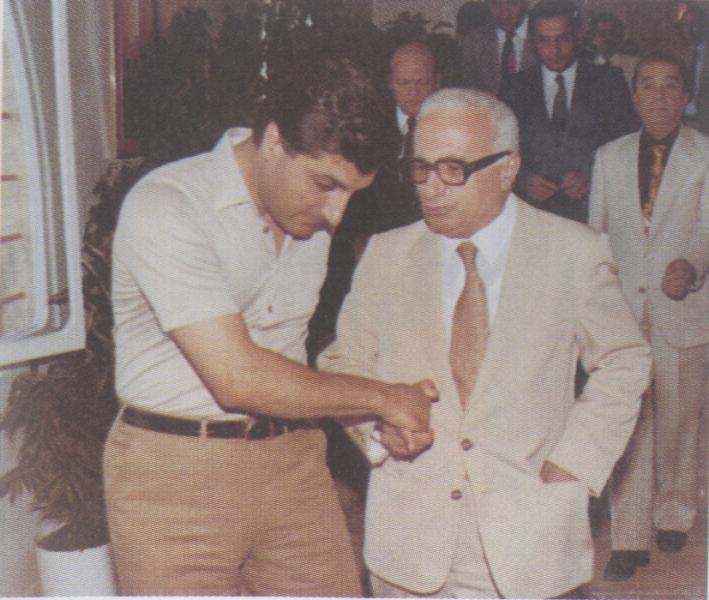
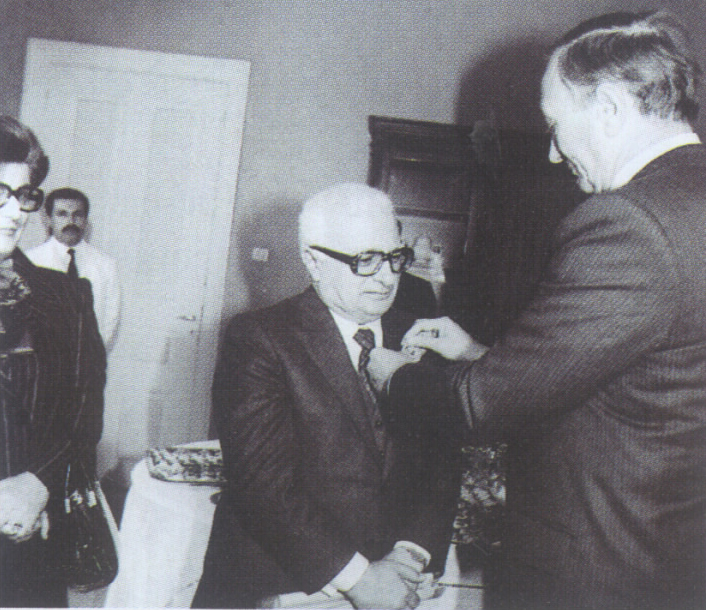
THE RELEASE. Baalbaki benefits from the amnesty under President Charles Helou. He was released from prison with civilians. Under the mandate of Frangieh it will be the turn of the military. Three months later, he marries the woman who waited seven years for him, Maguy Nasr, his fiancée. Baalbaki continues to cooperate for a certain time with the party, then definitely breaks up for ideological reasons and will devote himself exclusively for the press. He publishes again Sada Loubnan.
Charles Hélou and Riad Taha will help him get back the publication licence. The newspaper will be published daily until the assassination of Riad Taha, President of the Press Union. Farid Abou Chahla will be entrusted with the mission but he died before bearing the torch of the press.
In 1982, a new council is elected. Today, Mohammed Baalbaki thanks his friends, those who entrusted him and designated him, more than once as president of the Press Syndicate.


